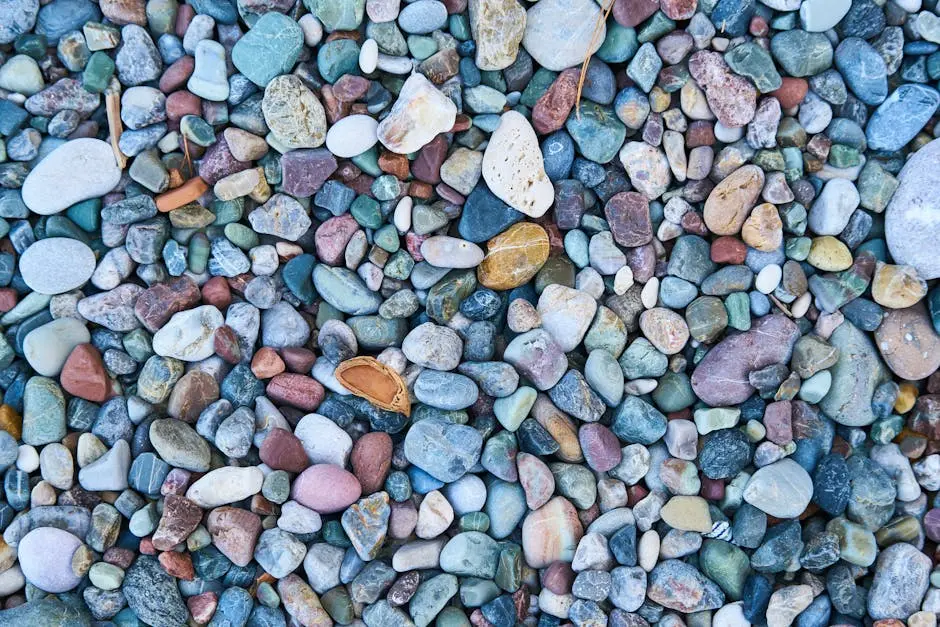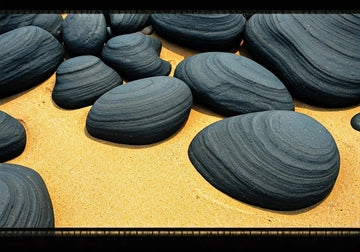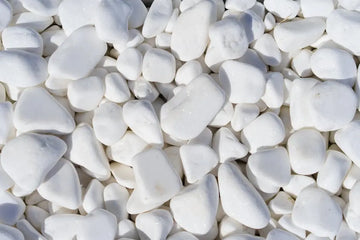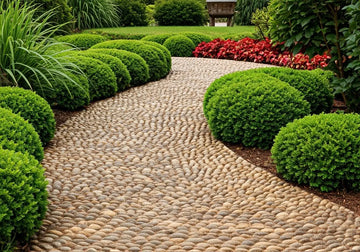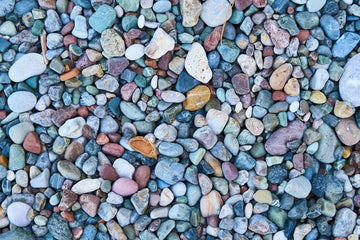
Natural stone pebbles have gained popularity as a decorative and functional element in gardens. But are they a sustainable choice? In this FAQ-style blog, we’ll explore the sustainability of using natural stone pebbles in your garden, addressing common questions and concerns.
What Are Natural Stone Pebbles?
Natural stone pebbles are small, rounded stones typically found in riverbeds or on beaches. They come in various sizes, colors, and textures, making them a versatile option for garden landscaping and decorative purposes.
These pebbles are formed over many years through natural processes of weathering and erosion. Their smooth, rounded shapes are the result of being tumbled in water bodies, gradually wearing down the rough edges into softer, more uniform surfaces. This natural formation process makes each pebble uniquely textured.
Available in a variety of colors like white, black, grey, and even multi-colored mixes, natural stone pebbles can easily complement any garden design. Whether you’re looking to create a rustic, natural look or a more modern, polished appearance, these pebbles can serve as the perfect component.
One of the appealing features of natural stone pebbles is their versatility. They can be used for pathways, borders, water features, or even as a ground cover. Their inherent natural beauty makes them a go-to choice for gardeners and landscapers aiming to enhance aesthetic appeal.
How Are Natural Stone Pebbles Sourced?
The sourcing of natural stone pebbles involves collecting stones from riverbeds, beaches, or quarries. Ethical sourcing practices should be considered to minimize environmental impact and ensure the long-term availability of these resources.
Ethical sourcing is crucial when it comes to natural stone pebbles. Overharvesting from riverbeds and beaches can disrupt local ecosystems, affecting aquatic life and vegetation. For this reason, it’s important to verify that your supplier adheres to responsible collection practices.
In some cases, natural stone pebbles are mined from quarries. This process generally has a lower ecological impact compared to unregulated riverbed or beach collection, but it’s still essential to consider the environmental policies of the mining operation. Make sure your supplier is engaged in responsible quarry management.
Some suppliers offer recycled or repurposed pebbles. These pebbles are collected from previous projects or unused construction materials, thereby reducing the need for new extraction. Opting for recycled pebbles can be a more sustainable choice if you are concerned about environmental impact.
What Are the Environmental Impacts?
The environmental impact of natural stone pebbles largely depends on how they are sourced. Responsible collection practices minimize disruption to ecosystems. Always check if your supplier follows sustainable practices to reduce ecological disturbances.
Using pebbles in your garden can actually reduce water usage. Unlike organic mulches, which decompose and require frequent watering, pebbles help soil retain moisture by reducing evaporation. This can contribute to more sustainable garden maintenance, especially in arid regions.
Another potential impact to consider is transportation. Pebbles can be heavy and transporting them over long distances can contribute to carbon emissions. When possible, source pebbles locally to cut down on transportation-related environmental costs.
Waste is another factor. Unlike organic materials that decompose and return nutrients to the soil, stone pebbles are inorganic and don’t degrade. However, their longevity can also be seen as a benefit, reducing the need for frequent replacement and thereby generating less waste over time.
Are Natural Stone Pebbles Durable?
Yes, natural stone pebbles are exceptionally durable. They can withstand various weather conditions and last for many years without significant wear and tear, making them a sustainable option for long-term garden use.
Durability is one of the standout benefits of natural stone pebbles. Unlike organic mulches that break down and need frequent replacement, stone pebbles can endure through all seasons. They are resistant to elements like wind, rain, and sun, making them ideal for outdoor use.
Natural stone pebbles don’t just last—they retain their aesthetic appeal over time. While other materials might fade, chip, or disintegrate, these pebbles remain largely unaffected, providing long-term beauty and functionality to your garden.
The natural durability of these pebbles means less maintenance in the long run. You won’t have to worry about them breaking down or causing soil quality issues. This translates to less frequent garden updates and more time to enjoy your outdoor space.
How Do Natural Stone Pebbles Compare to Other Mulching Materials?
Natural stone pebbles offer a longer lifespan and lower maintenance compared to organic mulches like wood chips. They do not decompose, which means they do not need to be replaced frequently, reducing waste and ongoing costs.
One of the primary differences between natural stone pebbles and organic mulches is decomposition. Organic mulches, while beneficial for soil nutrient content, require regular replacement as they break down. This process can be labor-intensive and costly over time.
Stone pebbles, on the other hand, provide a more permanent solution. Their durability means they can stay in place for years, reducing the need for ongoing maintenance. This makes them a cost-effective choice for those looking to create a low-maintenance garden.
While organic mulches can attract pests and harbor fungi, natural stone pebbles do not. This can enhance the overall health of your garden, making it easier to manage and reducing the risk of pest infestations.
Can Natural Stone Pebbles Improve Garden Health?
Natural stone pebbles can contribute to garden health by promoting better drainage, reducing soil erosion, and preventing weed growth. Their thermal properties can help maintain soil temperature, benefiting plant root systems.
Good drainage is essential for plant health. Natural stone pebbles create a permeable layer that allows water to seep through, preventing waterlogging. This is particularly useful in areas with heavy rainfall or poor soil drainage.
Preventing soil erosion is another key benefit. When placed on slopes or areas prone to erosion, stone pebbles help hold the soil in place. This minimizes the loss of topsoil and supports healthier plant growth.
Weed control is a constant challenge for gardeners. Stone pebbles create a barrier that inhibits weed growth while still allowing moisture and nutrients to reach your plants. This can significantly reduce the time and effort spent on weeding.
Additionally, the thermal properties of natural stone pebbles help regulate soil temperature. They absorb heat during the day and release it slowly during the night, creating a more stable environment for plant roots, which can enhance overall growth and resilience.
What Are the Aesthetic Benefits?
Aside from their functional benefits, natural stone pebbles enhance the visual appeal of a garden. They come in various colors and textures, allowing for creative designs and a polished look that complements the natural environment.
The color and texture options available with natural stone pebbles are vast. From sleek black river stones to white marble chips, you can find a color that matches your garden’s theme. These pebbles can also highlight and frame other garden features like flower beds, pathways, and water elements.
Moreover, stone pebbles can be used to create interesting patterns and designs. Arrange them in a mosaic, use them to line pathways, or scatter them around stepping stones for a unique and personalized touch to your garden layout.
The natural look of these pebbles blends seamlessly with almost any garden style, be it modern or traditional. Their uniformity and simplicity allow other elements of your garden—such as plants and garden decorations—to stand out more prominently.
Final Thoughts on Natural Stone Pebbles as a Sustainable Choice
In conclusion, natural stone pebbles can be a sustainable option for your garden if sourced responsibly and used mindfully. They offer durability, aesthetics, and minimal environmental impact when compared to some alternatives. Considering your garden’s specific needs and the origin of the pebbles can help you make an informed and eco-friendly decision.

